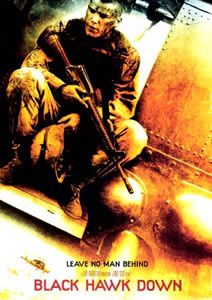only the dead have seen the end of war*
 Finally, I made the time to watch Black Hawk Down. Initially, I expected a war movie, but it turned out to be (well, for me it is) a half docu-war movie with a humanitarian and political undercurrents.
Finally, I made the time to watch Black Hawk Down. Initially, I expected a war movie, but it turned out to be (well, for me it is) a half docu-war movie with a humanitarian and political undercurrents.Scene #1
The first scene has a thick "gladiator-like" musical background. Is it a Ridley Scott trademark? Dunno..
A gripping first scene. Truck loaded with food aid (rice) in a distribution point somewhere in Mogadishu. Chaos. Crowd. People were all over the place - they were practically attacked the truck. Logistic workers (presumably) were throwing the rice bags out of the truck. Men and women were fighting for the rice. Rice bags were grabbed, tugged, torn away. Rice spilled on dusty earth. A perfect chaotic rice distribution. There were no stamps, no coupons, no queue, no beneficiaries (IDPs** list).
An armed car - a pick up vehicle with a machine gun on it, came up and emptied live bullets to the crowd. The civilians. While yelling, that the rice belonged to General Aidid --- the ruling regime leader.
A total chaos.
Scene #2
A US Somalia Operation Base asked for a backup to the UN in an UN-Safe zone, where the Pakistani and Malaysian soldiers were housed. UN tanks strolled out of the safe haven to extract trapped US soldiers in a planned 30 minutes operation that revolved into a full 24 hours urban war.
That scene struck me because as far as I know, in most cases, the big, gigantic and bureaucratic UN has been described as incapable and feeble.
Black Hawk Down was:
>> About a very absorbing movie due to its proximity to my professional life (no, I'm not somebody who wears uniform).
>> About working colleagues, who has a big chance of experiencing (be that in the past, present and future) such hellish, anarchic and frenzied situation in any conflict hot spots in my part of the world.
>> About a situation and condition so liquid, which makes security (both personnel and situation) very hard to be determined nor guaranteed; while on the other hand, humanitarian actions must be sustained.
>> About to what extent should a situation is considered as secure? From whose point of view? Are there any exact measures to assess security?
>> About soldiers who were trained and paid to die and to stay alive at their best under any circumstances.
>> About soldiers, who were flown into and thrown out to some foreign land and areas they have never heard before and were ordered to stay alive and to prepare to die at the same time.
>> About people who were not part of the war, had never been in a war; were unable to any extent understand reasons behind a war and reasons for people to go to war.
>> About the person next to you.
>> About one's inability to choose and to expect, who will be shot at and inability to provide any assistance whatsoever.
>> About whether military and war are that bad?
>> About the chance of peaceful negotiation in time of war.
>> About whether war is totally unavoidable?
>> About the cost of a nation's pride.
>> About considering our present atmosphere, whether we are ready and brave enough to stand such situation?
The first urban war that the US has gone into took place almost 10 years ago. When I was barely a freshman at my university, trying to understand the term of "international affairs".
Where were you on October 3, 1993?
la brioche doreé,
blok m plaza,
sat, 02/03/02 (original)
sat, 14/12/02 (revised)
* plato
** IDPs: internally displaced persons.
people who are forced to leave their hometown to seek refuge in another area within one's national border.
***movie poster found in google.com.
site of origin: http://www.cartelia.net/fotos/b/blackhawkderribado.jpg
Labels: movie
0 Comments:
Post a Comment
<< Home